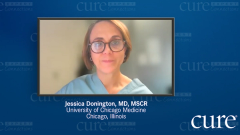
Early Non-Small Cell Lung Cancer and the ADAURA Trial
Dr. Jessica Donington explains how the results of the ADAURA trial changed the treatment algorithm in the adjuvant setting in early non-small cell lung cancer.
Episodes in this series

Martin Dietrich, M.D., Ph.D.: Let’s talk about your approaches to the next steps in therapy and how you talk to your patients about adjuvant treatment. You’re typically the first contact in this clinical setting.
Jessica Donington, M.D., MSCR: My conversations about adjuvant therapy start preoperatively, warning everybody that if there’s lymph node involvement, if the disease extends to the edge of the lung, we’re definitely going to recommend adjuvant therapy, and that most patients who are strong enough to undergo surgery are also strong enough to undergo adjuvant therapy. And you’re right, we put a lot of effort and they put a lot of their time into going through surgery. I hate for people not to also take advantage of everything they can do to improve their survival. While cisplatin or platinum-based chemotherapy has been the standard of care for a very long time, since about 2005 for resected patients, we did have some very exciting changes in what we recommend to our patients in the last two years.
The first real change we saw came out of a trial called ADAURA. This was a trial for patients with EGFR mutations. The EGFR mutation is one of the most common mutations that we see in lung cancer. It’s called a driver mutation, meaning that this one misplaced gene really drives the tumor behavior. And the ADAURA trial was the first trial that didn’t treat everybody but relied upon that biomarker, the patient’s individual tumor, to tell us who was allowed in the trial. It was a very large trial, about 1,200 patients around the world who had resected tumors, stage I through IIIA, who underwent a complete resection. They were encouraged to get their regular chemotherapy like we discussed. And then if they had this EGFR mutation, they were randomized to receive a targeted therapy called osimertinib or just a placebo. The osimertinib is an EGFR-targeted therapy, a medicine designed just for those tumors and just for that defect.
What they found in this trial was giving patients osimertinib—it’s a pill, it’s not an infusion, it was a pill they take every day—by taking that medicine, they were able to reduce tumor recurrence by over 80%. Now, they did have to take the pill for a long time, three years. But the pill was well tolerated. And it is also well tolerated when we give it to patients with metastatic disease. It was equally well tolerated, and patients took their medicine, they took it straight through, no one got bored or tired or was annoyed because they got a rash on their face. They kept taking the medicine. The trial had an incredible impact on the risk of tumor recurrence. The overall results of the trial are not finalized, meaning we don’t know whether keeping tumors away for three years is enough to improve overall survival, or will those patients have their tumors come back? But certainly, as a lung cancer doctor, I feel like keeping the tumor away is a really good thing.
Therefore, we’re kind of excited that this medicine has been recently approved by the FDA for the treatment of patients with EGFR-mutated tumors who undergo a complete resection and receive chemotherapy. There are some patients who asked if they have to have their chemotherapy, “Do I still need to have that platinum medicine for four cycles?” The ADAURA trial didn’t answer that question. But most of us who are trying to cure our patients do recommend that patients still get that chemotherapy. The other important thing about this trial is it brought home the importance of the molecular analysis on resected tumors. We had all gotten used to looking at the molecular makeup of tumors for patients who had metastatic disease, but most of us weren’t looking in the earlier stage patients. But this trial made it incredibly clear that we need to do that. This medicine only works for people who have this mutation. And if you don’t look for the mutation, you’re never going to know. This medicine is not helpful if you don’t have the mutation.
It is a shift in how we think about earlier stage patients, that we don’t just have one option that fits all. It used to be for earlier stages it was kind of a one-size-fits-all, everybody got a standard treatment as long as they were healthy enough to tolerate it. Now it’s becoming much more personalized. And therefore, we need not only to know the stage of your tumor and your overall health, now we also need the molecular makeup of the tumor to find the exact treatment that would work best for you.
Transcript edited for clarity.






